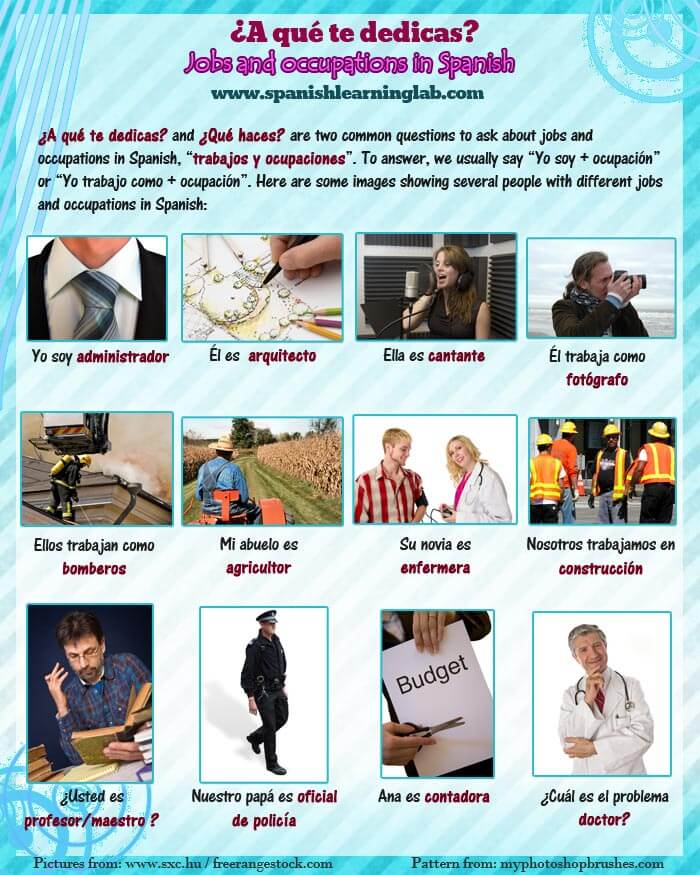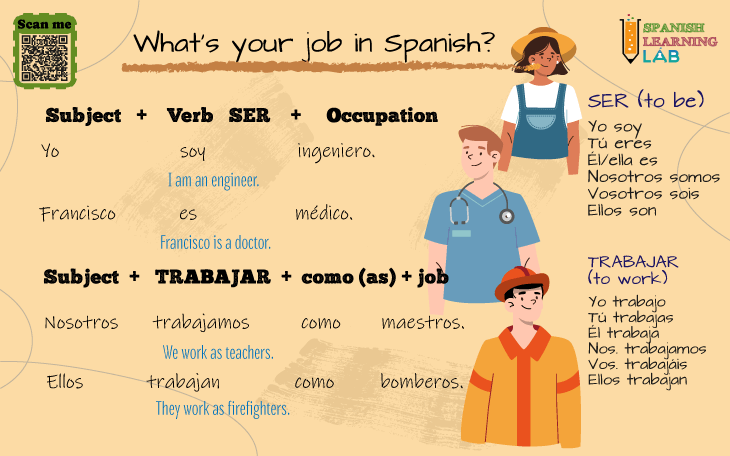There are two basic ways to ask “what is your job” in Spanish: ¿A qué te dedicas? and ¿Qué haces? This lesson presents a list of jobs and professions in Spanish through pictures and sentences with the vocabulary. We have included a lot examples and simple explanations on the topic as well. Comencemos…
Vocabulary intro: A list of jobs and professions in Spanish
There are many different words for occupations in Spanish, some more common than others. The picture below shows a list of jobs and professions in Spanish and how they can be used in basic sentences. Later, we will explain to you how these sentences work and how you can make your own. Think of people you have met that have these occupations so you can associate the new vocabulary with memories. This way it will be easier to remember.

How to ask “What is your Job ?” in Spanish
First of all, to ask “what’s your job” in Spanish you can use any of the following questions: ¿En qué trabajas (tú)?, ¿Cuál es tu trabajo? (what’s your job?), ¿Qué haces(tú)? (what do you do?), and ¿A qué te dedicas? (what do you do?). Most of the time the verbs TRABAJAR (to work), HACER (to do) and DEDICAR (to do) will be used when someone asks about your job in Spanish or when you do it. To ask in a more formal way, we simply change the pronoun TÚ for USTED and the verb forms as in ¿En qué trabaja usted?
Notice that the preposition EN will be placed before the word QUÉ in the question ¿En que trabaja…? and the preposition “A” is needed before QUÉ in the question “¿A qué te dedicas?”. Unlike English, questions in Spanish will place the preposition at the beginning not at the end.
Ways to ask what people do in Spanish
|
¿Usted es ingeniero?
Are you an engineer?
|
|
¿En qué trabaja usted? – Yo soy pescador
What do you do? – I am a fisherman
|
|
¿A qué te dedicas? – Yo soy secretaria
What do you do? – I am a secretary
|
Making sentences with jobs and professions in Spanish
SER + job names in Spanish
In order to make sentences about your job in Spanish, you will need to use the irregular verb SER (to be) in its forms SOY, ES and SON. Most of the time the structure to follow will be:

Since Spanish verbs change depending on the subject, it would be incorrect to say “Yo ser contador” because the verb SER must change to SOY to fit YO resulting in “Yo soy contador”. In English, it is possible to use the indefinite articles (A/AN) before an occupation, but this rule does not apply in Spanish. It would sound strange if we said “Yo soy un contador“. Besides, we only use UN or UNA before names of occupations when an adjective is added to describe the person, for example: Es un fotógrafo amable (he is a kind photographer) and Es una secretaria ocupada (she is a busy secretary). Both “amable” and “ocupada” are adjectives you can use to describe people in Spanish.
Below, there are some examples of sentences using a list of jobs and professions in Spanish along with the verb SER. Use the player to listen to the examples.
|
Marta es contadora en una compañía.
Marta is an accountant in a company
|
|
Carla es administradora de empresas.
Carla is a business manager
|
|
María es oficial de policía.
María is a police officer
|
|
Él es fotógrafo profesional.
He is a professional photographer
|
|
Alex es un buen intérprete.
Alex is a good interpreter
|
|
Él es el alcalde de nuestra ciudad
He is the mayor of our city
|
|
El señor Gómez es carpintero.
Mr Gomez is a carpenter
|
|
Los campesinos son muy trabajadores.
The farmers are very hard-working people
|
Other ways to say what you do in Spanish
Sometimes you can use the verb TRABAJAR plus the word COMO instead of SER to say what you do in Spanish, basically adding TRABAJA COMO (works as) after the subject, for example: “Él trabaja como bombero” (He works as a firefighter). The last way to talk about someone’s job is by saying the field they work on instead of their profession, being these fields or CAMPOS words like Mercadeo (marketing), Construcción (construction), Ventas (sales) and others, e.g. “Ana trabaja en mercadeo” (Ana works in marketing) and “Ellos trabajan en construcción” (They work in construction). Listen to these examples of sentences with jobs and professions in Spanish using “TRABAJA COMO” and more.
|
La enfermera es muy amable.
The nurse is very kind
|
|
El doctor de la clínica es muy bueno.
The doctor of that clinic is very good
|
|
Carlos trabaja como Cajero en un banco.
Carlos works as a cashier in a bank
|
|
Él trabaja como bombero.
He works as a firefighter
|
|
Él trabaja en construcción.
He works in construction
|
|
Las trabajadoras de la fábrica están de vacaciones.
The workers of that factory are on vacations
|
Related Spanish Worksheets:
- Jobs and Occupations in Spanish – PDF Worksheet
- Making Questions in Spanish – PDF Worksheet
- Dialogues about Jobs and Occupations in Spanish – PDF worksheet
- Job Schedules in Spanish – PDF Reading Worksheet
- Important jobs in Spanish – PDF Reading Worksheet
